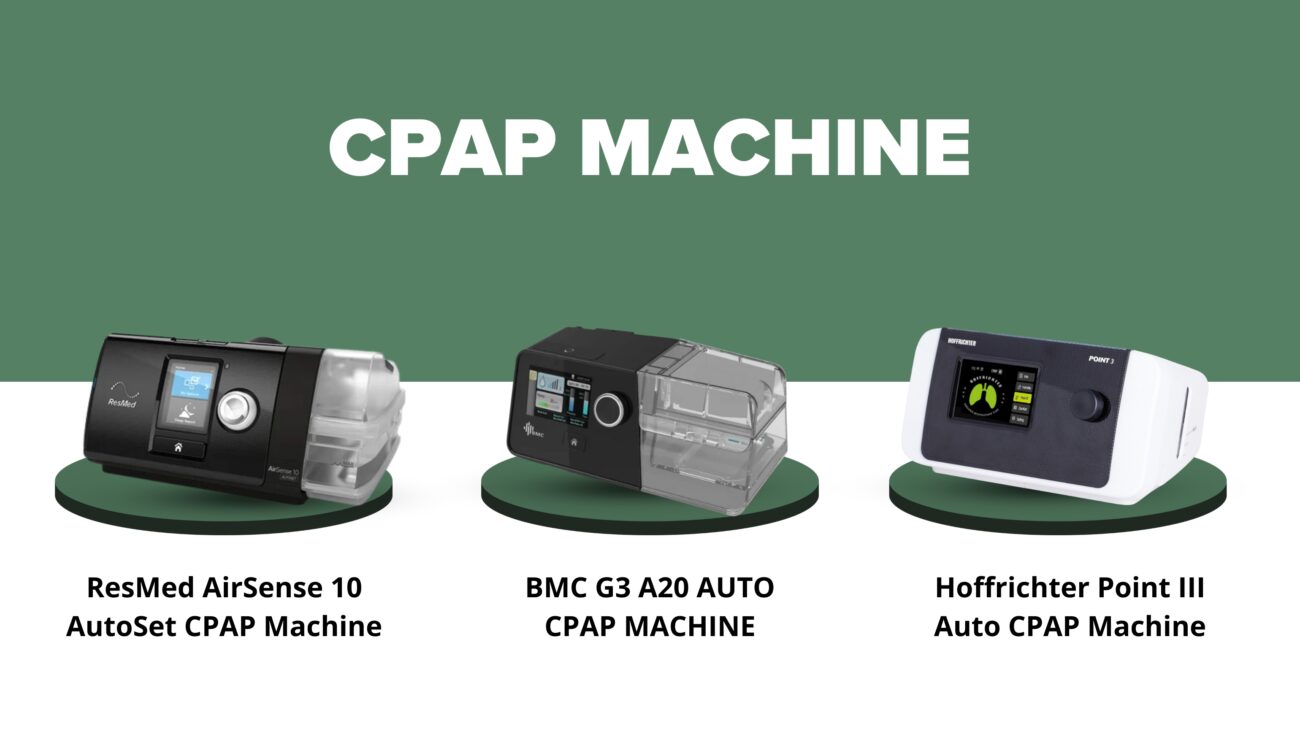If you or a loved one has sleep apnea, choosing the right treatment is essential for better sleep and overall health. Two common solutions are CPAP (Continuous Positive Airway Pressure) and BiPAP (Bilevel Positive Airway Pressure) machines. While they work similarly by delivering pressurized air to keep your airway open, they differ in how they function and when they are recommended. Let’s break it down so you can make an informed choice. Here in the LifePlus Medical blog, we’ll explain the differences between CPAP and BiPAP machines to help you make an informed choice.
What Are CPAP and BiPAP Machines?
CPAP: Continuous Positive Airway Pressure
CPAP is the most widely used and frequently recommended treatment for obstructive sleep apnea (OSA). This machine delivers a steady stream of pressurized air at a consistent level, preventing the airway from narrowing or closing.

Key Features of CPAP:
- Single Pressure Level: The same pressure is used for inhalation and exhalation.
- Effective for OSA: Works well for most mild to severe obstructive sleep apnea cases.
- Variety of Models: Options include fixed-level machines or Auto-CPAP (APAP), which adjusts pressure automatically based on your breathing patterns.
- Cost-Effective: CPAP is generally more affordable than BiPAP, making it accessible for most patients.
Top CPAP Machines Available
1. ResMed AirSense 10 AutoSet CPAP Machine
This auto-adjusting CPAP device features wireless connectivity and an integrated humidifier, ensuring comfortable and effective therapy tailored to your breathing patterns.
2. BMC G3 A20 AUTO CPAP MACHINE :
This advanced device is designed to provide comfortable and effective sleep apnea therapy. It features an integrated humidifier to prevent dryness and congestion and offers intelligent pressure adjustments that adapt to your breathing patterns for optimal comfort.
BiPAP: Bilevel Positive Airway Pressure
BiPAP machines offer a more advanced form of PAP therapy by providing two different pressure levels: one for inhalation (IPAP) and another for a lower level for exhalation (EPAP). This design can make breathing more comfortable, especially for individuals who struggle with CPAP or have more complex breathing disorders.

Key Features of BiPAP:
- Dual Pressure Levels: The lower exhalation pressure makes it easier for users to exhale.
- Ideal for Complex Cases: Often prescribed for central sleep apnea (CSA), chronic obstructive pulmonary disease (COPD), or severe obstructive sleep apnea requiring high pressures.
- Advanced Modes: Includes features like Spontaneous (S), Spontaneous/Timed (S/T), and Timed (T) settings for tailored support.
- Higher Cost: BiPAP machines are more expensive than CPAP but offer greater flexibility and comfort for specific conditions.
Top BiPAP Machines Available
1. ResMed AirCurve 10 VAuto BiPAP Machine
Combining comfort with advanced technology, this device adjusts pressure levels to suit your breathing, providing personalized therapy for complex sleep apnea cases.
The BMC G2S B25VT BiPAP offers customizable therapy modes and an integrated humidifier to effectively and comfortably treat sleep apnea and respiratory issues.
When to Choose CPAP or BiPAP
Choose CPAP If:
CPAP is the standard choice for obstructive sleep apnea. It prevents airway blockages, reduces snoring, and improves sleep quality. Choose CPAP if:
- You’ve been diagnosed with obstructive sleep apnea.
- You’re looking for a simpler and cost-effective treatment option.
- You don’t have complicated health conditions affecting your breathing.
Choose BiPAP If:
BiPAP is the preferred option for individuals with more complex or severe conditions. It’s especially useful if:
- You have central sleep apnea, COPD, or other respiratory disorders.
- CPAP didn’t work for you, or you felt uncomfortable.
- You require higher pressure levels than CPAP can provide.
By tailoring air pressure to your needs, BiPAP ensures you get the support required for better sleep and breathing, even in challenging cases.
Making the Right Choice
Your doctor or sleep specialist will recommend the best option based on your sleep study results and medical history. For most cases of OSA, CPAP is the first-line treatment. However, if you have complex breathing needs or struggle with CPAP, BiPAP may be a better fit.
FAQs About CPAP and BiPAP Machines
What is the difference between CPAP and BiPAP machines?
CPAP provides a steady pressure level, while BiPAP offers two distinct pressure levels, one for inhalation and one for exhalation.
Which is more comfortable: CPAP or BiPAP?
BiPAP is generally more comfortable for people who need higher pressure or have difficulty exhaling against CPAP’s continuous pressure.
Can I switch from CPAP to BiPAP?
Yes, if CPAP doesn’t meet your needs. A sleep study and doctor’s evaluation are necessary to make the change.
What does LifePlus Medical offer?
We provide high-quality sleep apnea solutions, including CPAP and BiPAP machines, accessories, and expert consultations.
Can LifePlus Medical help me choose the right machine?
Absolutely. Our sleep specialists guide you through selecting the best device for your condition.
Take the Next Step
At LifePlus Medical, we’re committed to helping you breathe easier and sleep better. Our team will ensure you get the right device if you need a CPAP or BiPAP machine. Contact us today to schedule a consultation or learn more about our products and services!

